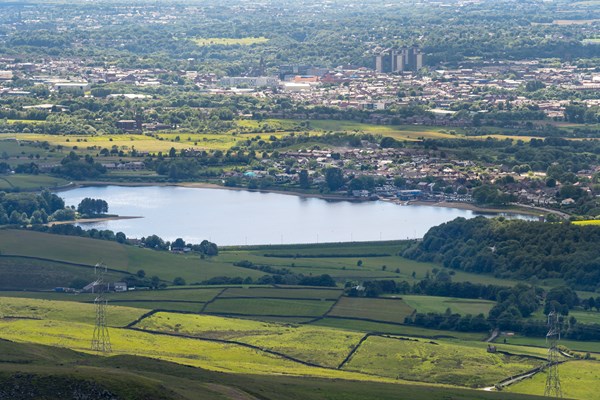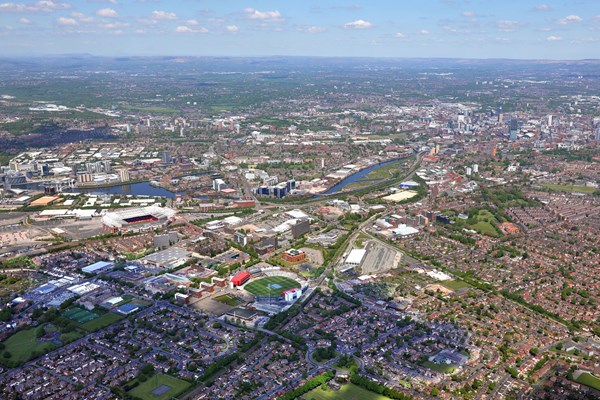
The Mayor of Greater Manchester calls on the city-region to back £50m of European Funding
Calls for projects to bid for three separate funding pots from the European Regional Development Fund (ERDF) have opened today (Monday 8 April). The funds, which are specifically for Greater Manchester, support investment in innovation, business and clean growth, and job creation.
The three calls are for:
- Science and Innovation
- Competitive Businesses
- Low Carbon Economy
The Mayor of Greater Manchester, Andy Burnham said: “I am calling on businesses, universities, communities and the public sector to help grow Greater Manchester’s economy in these vital areas by applying for a share of the £50m funding available. I look forward to seeing applications that will take up this great opportunity to show how we do things differently here and for the benefit of the city-region”
Outline applications are required to be submitted by 17 May 2019.
The details of what will be in each call is set out below. All ERDF projects will require applicants to identify 50% match funding. Projects must demonstrate that they have considered the use of the suite of GM Investment Funds, rather than grant, and why the investment funds are not suitable for delivering the project proposed.
PA1 – SCIENCE AND INNOVATION
Outline application form: https://www.gov.uk/european-structural-investment-funds/research-and-innovation-call-in-greater-manchester-oc15r19p-0903
Local Context:
Greater Manchester has consistently invested in our science and innovation assets from the National Graphene Institute and the Graphene Engineering Innovation Centre (GEIC), to the Hydrogen Fuel Cell Innovation Centre and Energy House 2. Having invested in these assets it is important that we now see the broader economic impact by an increase in the commercialisation of activity related to those assets. It is important to the success of Greater Manchester that we continue to invest in those areas of research and innovation that will deliver future growth and address some of the grand challenges we face, locally, nationally and internationally.
Local Priorities:
Up to £24.89m million European Regional Development Fund is available to deliver this call for projects based in Greater Manchester which will aid Greater Manchester in the development of technologies and application of innovation where we have strengths as identified in the Greater Manchester and Cheshire East Science and Innovation Audit.
Although applications will be considered which support the commercialisation of any of Greater Manchester’s science and innovation strengths, applications focussed on delivering applied health innovation will be welcomed within this call.
Applicants should ensure that that Greater Manchester continues to develop its influence in these and related areas, and in particular projects that will address these three priority areas:
- Increasing entrepreneurship and business growth
- Improve the existing science base by clearly demonstrating an increase in commercialisation
- Expand and accelerate the commercialisation of Greater Manchester’s science assets, research or innovation.
Applications should demonstrate how they will build on the scientific excellence in the local Higher Education Institutions and have strong private sector partner involvement and investment.
PA3 – COMPETITIVE BUSINESSES
Outline application form: https://www.gov.uk/european-structural-investment-funds/sme-support-call-in-greater-manchester-oc15r19p-0904
Local Context:
It is important that new and scale-up businesses across the whole of Greater Manchester have access to facilities in which to grow in the places they want to do business. This means making appropriate workspace available e.g co-working spaces, where demand exists either within geographies that are underserved or for sectors where the appropriate provision does not exist.
Local Priorities:
Up to £13.58m European Regional Development Fund is available to deliver this call which invites applications for proposals that provide the facilities to increase the competitiveness of Small and Medium Sized Enterprises.
This call will look for proposals to support ERDF investment in new workspaces (such as co-working spaces) for new and existing Greater Manchester SMEs where suitable provision is not available, and demand exists. This can include areas such as town centres and in sectors that are underserved by appropriate provision.
Therefore, we invite applications for new workspaces that fulfil this criteria.
All applicants must demonstrate how they will add value to, and work in conjunction with, the Growth Hub in Greater Manchester.
In addition, all proposals must show how their application fits within and links to the Greater Manchester Strategy and relevant GM priorities identified in, for example;
- the Greater Manchester and Cheshire East Science and Innovation Audit;
- the Greater Manchester Local Industrial Strategy;
- emerging Town Centre regeneration proposals.
Applicants should recognise the Greater Manchester innovation ecosystem and be clear how their application will develop that ecosystem where is can be improved, as well as aligning with existing programmes that support the key sectors identified in the GMS.
pa4 – LOW CARBON ECONOMY
Outline application form: https://www.gov.uk/european-structural-investment-funds/low-carbon-call-in-greater-manchester-oc15r19p-0905
Local Context:
A scaling up of measures to reduce non-renewable energy use is now required across Greater Manchester’s existing public and private sector assets, in order to deliver the step change required to achieve Greater Manchester’s carbon reduction targets.
Local Priorities:
Up to £12.5 million of European Regional Development Fund is available to deliver this call for projects based in Greater Manchester. Projects will contribute to the reduction in greenhouse gas emissions by maximising the energy efficiency, energy management and energy generation potential across public sector and private sector estate assets.
Projects are expected to further develop and where possible, incorporate existing innovation from across the whole energy system. This could encompass a range of interventions, from decentralised energy generation, energy storage, energy efficiency measures, to alternative heating and cooling systems, urban mobility, process integration, energy monitoring and smart control.
Proposals should build upon the lessons learnt from existing GM programmes, wherever possible connecting with existing local business support activity to enable local suppliers to benefit from the market created.
Article Published: 10/04/2019 09:58 AM



